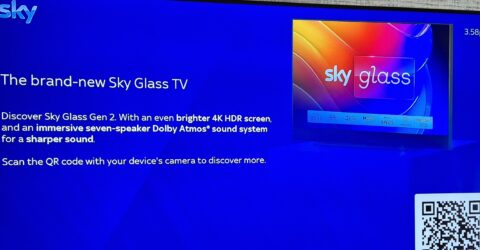The pros and cons of Sky Glass
As a second-generation product arrives on the market, we consider the pros and cons of Sky Glass

It’s been four years since Sky unceremoniously severed the connection between its suite of live TV channels and the satellite dishes which had historically powered it.
Back in 2021, we wrote about the arrival of Sky Glass – an attempt by the British broadcaster to challenge the likes of Netflix and Disney+ with a broadband-powered subscription service.
Unlike Netflix and its peers, Glass used Sky-branded smart TV sets featuring proprietary Sky OS software powered by fibre broadband.
Now there’s a new generation of hardware on the market, following last month’s unveiling of revised TV sets.
That makes this a good time to review the pros and cons of Sky Glass, determining whether it’s worth considering ahead of a standard Sky dish package and a generic smart TV.
Spot the difference
Second-generation Sky Glass televisions offer the same trilogy of screen sizes as before – 43, 55 and 65 inches.
They incorporate new frame colours, a brighter 4K display and a seven-speaker Dolby Atmos setup, with a soundbar and twin subwoofers packing a meaty aural punch.
The biggest departure from conventional smart TVs remains the option to either buy the device outright or pay monthly.
This is an attempt to ape the smartphone market, with interest-free monthly payments bringing the cost of a 43-inch unit down to just £14 per month on a four-year contract.
Speaking of subscriptions, buyers can sign up to one-month or two-year Sky TV contracts costing upwards of £15 per month depending on how many channels you want.
There are rumours of a slimmed down set to be called Sky Glass Air, which should reduce the price of a Glass screen. This presently ranges from £699 to £1,199, depending on screen size.
And this brings us onto the pros and cons of Sky Glass.
Pros
Firstly, and most importantly, Sky Glass provides full access to Sky’s panoply of film, sports and entertainment channels without requiring a satellite dish.
If you live in a conservation area, rent your home or live in a block of flats, the need for a 60cm external dish might have hitherto been a deal-breaker in terms of getting Sky services.
The main alternative until Sky Glass arrived was NOW TV, which has its merits but is also comparatively limited and expensive.
Sky Glass is simplicity itself to use. Turn on the device, connect it to your home WiFi (or hardwire it to your broadband router using an Ethernet cable) and you’re ready to watch.
Although there are notable differences from Sky Q or the older Sky+ service, they won’t take long to master, and Sky won’t deactivate legacy platforms until Sky Glass is fully operational.
Being able to effectively HP the set is great for households on a budget, and Sky are quite amenable to television packages being enlarged or reduced as household finances fluctuate.
Cons
Because it relies on home broadband, Sky Glass isn’t suitable for households still reliant on ADSL services. You need a minimum 25Mbps connection – or 30Mbps to watch in UHD.
You’re also locked into Sky’s ecosystem for up to four years depending on the contract, which might become an issue if your circumstances subsequently change.
If you tire of Sky’s content, there’s no way to use a Glass television without a Sky subscription.
A four-year contract on a device sold with a two-year warranty represents a clear risk, which would steer us towards an outright purchase.
The televisions are well-equipped and reasonably priced, though a Sky Glass unit does preclude you from choosing your own TV from the huge variety stocked by electrical retailers.
Those take-it-or-leave-it specifications also mean you can’t use existing soundbars, accessories or wall-mounting brackets.
There are three HDMI ports, but no SCART, RCA or composite sockets, optical audio or 3.5mm headphone jacks. This prevents the use of camcorders, wired headphones, etc.
For new households with limited older tech seeking a simple plug-and-play media centre, Sky Glass has much to recommend it – but it won’t suit everyone.






